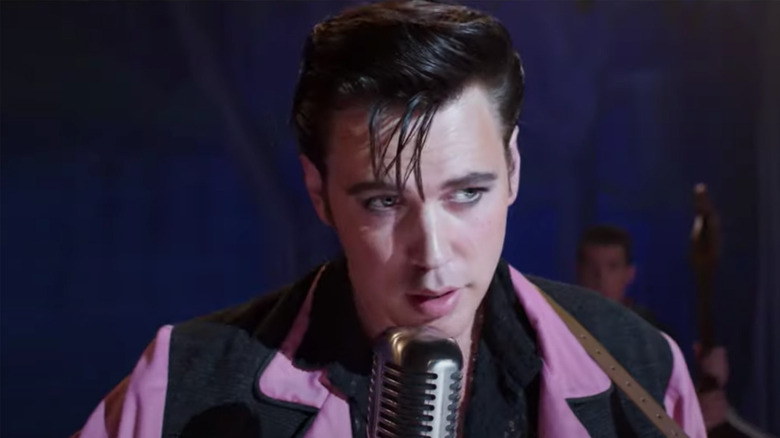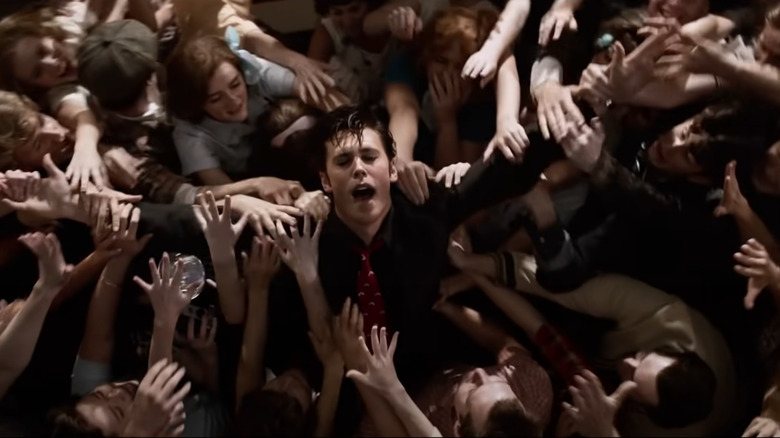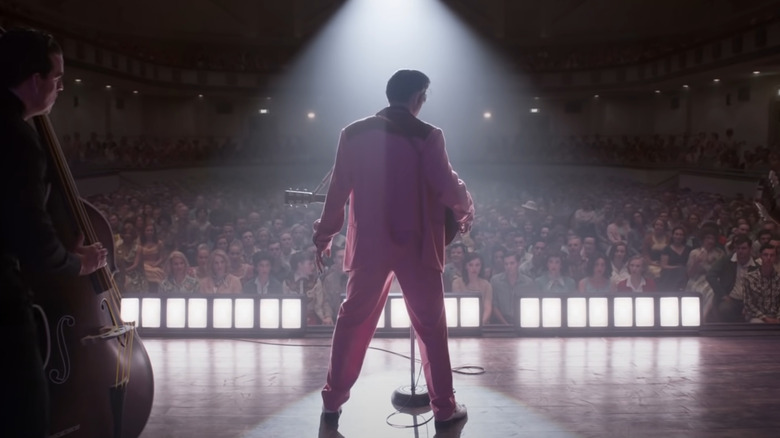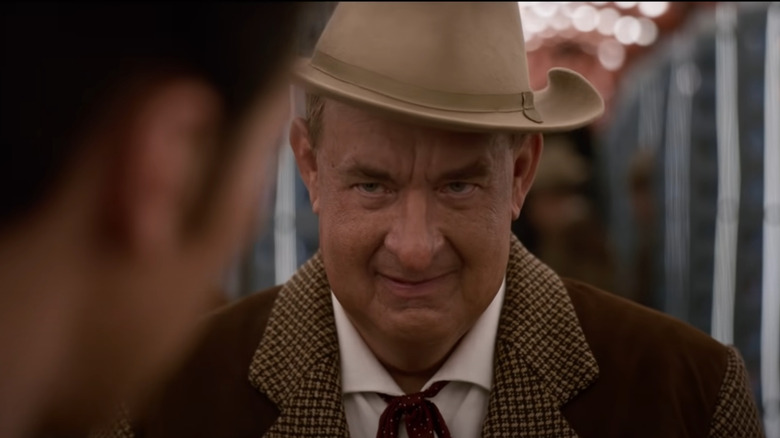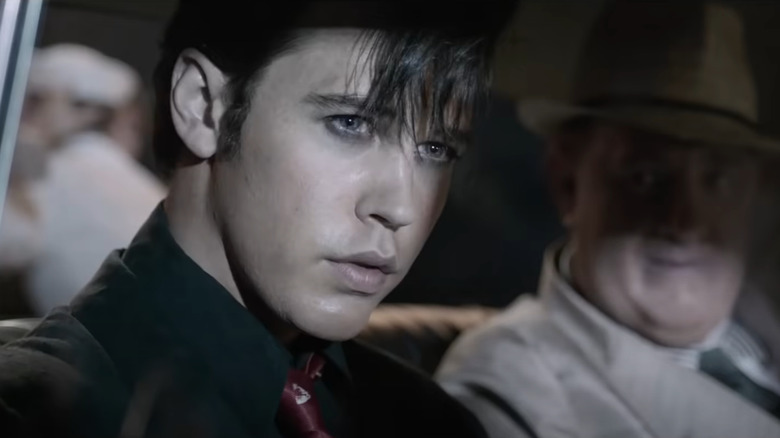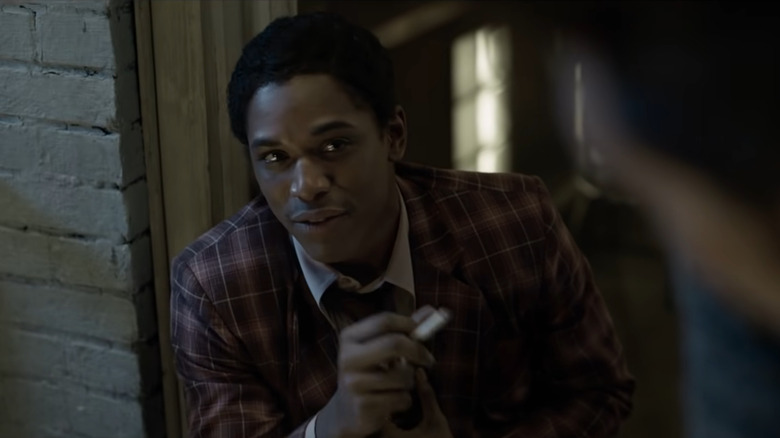The True Story Behind Baz Luhrmann's Elvis, And What The Biopic Changes
Who better to direct a movie about one of the most flamboyant rock stars than the equally ostentatious Baz Luhrmann? "Elvis" was never going to be a gritty, dramatic retelling of the superstar's ups and downs, and there's a good case to be made for why it shouldn't be — one made quite convincingly by the movie itself. It's hard to overstate Elvis Presley's cultural impact, particularly his early years when he shattered the cultural landscape by bringing the raucous aesthetics of his brand of rock and roll to stuffy mainstream America. Luhrmann's style was always going to be well-suited to depicting such an iconic story on the big screen.
The "Moulin Rouge!" director didn't hold back in his ambitious biopic, constructing a glamorous and suitably bombastic movie that doesn't shy away from the hardships endured by everyone involved. That's an impressive achievement considering he had to condense Presley's 42 years — in which he lived more life than most people do their entire lives — into 2 hours and 39 minutes.
To do so, the director not only takes some creative liberties and makes some much-needed edits, but enlists "The Colonel" himself to tell the story. Tom Hanks' Colonel Tom Parker, Presley's (Austin Butler) longtime manager, acts as narrator throughout. During that time he challenges popular notions of his character being the "villain" of the story and conducts an often disorienting retelling of the singer's life, set to the mellifluous tones of Doja Cat and Backstreet Boys (because Baz Luhrmann). The result is often as impressive and as baffling as it sounds, but how true to Presley's real story can such a biopic be? Luckily, I'm about to tell you.
Baz Luhrmann's Elvis is not your average musician biopic
The movie starts in 1997, with Colonel Tom Parker on his deathbed. (Thankfully, Luhrmann nixed an opening section with Tom Hanks' character floating in space.) He recalls first hearing Elvis Presley in the mid-1950s at a carnival featuring country singer Hank Snow (David Wenham) before watching the young singer wow the crowd at a "Louisiana Hayride" show. Parker sees dollar signs, pursues Presley, and successfully gets the singer to hire him as his manager.
As his popularity begins to skyrocket, the conservative society of the day pushes back against "Elvis the Pelvis," prompting a few dark nights of the soul for the rising star. The singer decides to embrace his true "provocative" self and lands a stint in the Army as punishment. While on duty, Presley meets his future wife, Priscilla.
Next, there's a section depicting The King as a wayward singer adrift in the tawdry currents of 1960s Hollywood. The famous "'68 Comeback Special" reasserts a leather jumpsuit-clad Presley as his true singing, gyrating self. Then begins the Las Vegas era, where Parker secures an ongoing residency for the singer at the Hilton International Hotel. A non-stop performing schedule, a snowballing prescription drug addiction, and the revelation that Colonel Parker is not who he has claimed to be, all combine to bring Presley to his knees. He fires Parker on-stage after discovering he's actually an illegal Dutch immigrant who made a deal with the Hilton in exchange for gambling credit.
After The Colonel threatens to sue Presley for $8 million, the reluctant performer maintains his unrelenting schedule, eventually divorcing his wife and dying at the age of 42 from a heart attack. In 1997, Parker passes away before some on-screen text explains how a series of lawsuits in the 1980s revealed the extent of his financial exploitation of Presley.
Elvis is an exaggerated version of real-life events
Baz Luhrmann's take on Elvis Presley is of course packed with his usual lush production design and fancy camera work, making for a maximalist experience throughout. In that sense, the "Great Gatsby" director had deviated from Presley's real experiences before he shot a single scene. But while there are multiple points where the narrative differs from actual events (more on those later) much of the film lines up with its main character's real life. Sure, the events might often be exaggerated and always bathed in the famous Luhrmann glitz, but much of it is true to reality.
Presley did indeed draw inspiration from gospel, country, and the music of Black blues and R&B artists such as Little Richard and Big Mama Thornton, with Thornton being the original singer of "Hound Dog." Presley was signed by Colonel Parker, and did indeed cause a stir in mainstream society for his raunchy dance moves and general "uncouth-ness." Time in the Army? Check. A prolific acting career? Check. Even the long-running Vegas residency and its accompanying drug issues are straight from Presley's real story. So too, as the film points out, is the financial abuse perpetrated by The Colonel, which the lawsuits of the '80s brought into devastating light.
Luhrmann's visual flair aside, it turns out the film remains somewhat faithful to its source material. That's not to say there aren't some obvious creative interpretations made throughout, as well as some notable deviations from real-life events. But on the whole, Luhrmann — who almost abandoned "Elvis" at one point — makes sure to stick to the facts in terms of the big narrative beats.
The Colonel's unreliable narration
One of Luhrmann's big creative decisions was to have Tom Hanks' Colonel Parker narrate the entire story. It's a bold choice considering Colonel Tom Parker — the good 'ol boy from West Virginia — didn't even exist. He was actually Andreas Cornelis van Kuijk, a Dutch immigrant who came to the U.S. in 1929, and who — according to the New York Post — may or may not have been involved in the murder of a girl named Anna van den Enden in his native Breda.
And while "Elvis" doesn't shy away from painting Parker as a crook, the film certainly takes some liberties with its narrator. Talking of bold choices, Hanks puts on a heavy Dutch accent to play the part whereas in reality, as Vanity Fair reports, Parker did his best to mimic a southern accent and apparently had most people convinced. The film also shows him and Presley as being quite close so as to make Parker's eventual betrayal that much more devastating. But, according to James L. Dickerson, author of "Colonel Tom Parker: The Curious Life of Elvis Presley's Eccentric Manager", the two never really "hit it off" and Parker never even really liked music.
Otherwise, the movie gets a lot right about The Colonel, although he wasn't actually fired by Presley while the star was on-stage in Vegas. Parker was, however, drowning in gambling debt when he made the deal with the Hilton. He was also concerned about his immigration status in the U.S. and likely sabotaged Presley's chance to go on global tours as a result. And he did, of course, exploit the superstar since the beginning of his career — taking a 25% cut of his profits before raising that already-high percentage to an incredible 50%.
America vs Elvis the pelvis
"Elvis" makes much of its protagonist's clash with conservative America. Early in the story, the film foreshadows this battle when Presley appears on the country music radio show, "Louisiana Hayride." The headline act, Hank Snow (David Wenham), is unimpressed with the young singer and appears pleased when Parker takes him off on a solo career. But Snow's real-life son, Jimmie Rodgers Snow, would reveal in a 2022 interview on In Your Corner that although "a story went around [...] where people were saying that dad got mad," his father was actually rooting for Presley "because the more fame he got the more money [...] Hank Snow Enterprises would get."
In this sense, Luhrmann uses the older Snow as a way to symbolize the widespread distaste for Presley among America's more traditional demographic. The film ramps things up when it comes to the Memphis Fairground riot — itself an amalgamation of multiple concerts where Presley was warned against performing any provocative moves. But even this is overblown in the sense that it shows Colonel Parker, under pressure from political figures at the time, to be the architect of Presley's transition to a clean-cut, all-American kid. In fact, as Alana Nash told Variety, "Parker loved it that Elvis was like a male striptease artist" and welcomed controversy as long as it sold tickets.
Presley's stint in the Army is similarly inaccurate — in the film his time in the Army is portrayed as a punishment imposed against the will of Parker and the singer. In fact, The Colonel worked with the Pentagon to orchestrate Presley's time in the armed forces in a likely attempt to expand his appeal. Of course, if Luhrmann had opted to keep all this information in his movie, he'd have to actually release his four-hour cut of "Elvis."
Appreciation or appropriation?
One of the issues surrounding Elvis Presley's legacy is his use of other artists' material — specifically Black artists. Being dubbed the "King of Rock and Roll" was always going to cause major controversy, considering Black contemporaries like Chuck Berry could just as easily lay claim to that title. And many of Presley's hits were also originally recorded by Black artists, including Arthur Crudup's "That's Alright, Mama," and Big Mama Thornton's "Hound Dog."
In that sense, Presley clearly profited greatly from music pioneered by Black artists. It's no wonder that in 1994, Ray Charles would tell NBC's Bob Costas: "To say that Elvis was so great and so outstanding, like he's the king ... the king of what? I know too many artists that are far greater." But as The Conversation reports, artists such as Little Richard and James Brown were fans of Presley, with the latter dubbing him a "true American original." Even the man himself acknowledged his status as a guest in the house of rock and roll, stating: "rock 'n' roll was here a long time before I came along."
Unfortunately, Luhrmann sidelines this debate in favor of depicting Presley as beloved by his Black contemporaries and who couldn't help but be influenced by artists like Sister Rosetta Tharpe and B.B. King. In fact, the movie depicts Presley and King as ongoing friends — something biographer Alanna Nash undermines, stating the two would "visit some in Las Vegas, but that was in the '70s." Regardless, the questions surrounding Presley's use of Black musical styles remain. And in a film impressive for its ability to condense Presley's life, this might be its most significant omission.
There's a lot more to Elvis' family story
Though it necessarily omits a lot, "Elvis" manages to squeeze in quite a bit of family-related narrative. The young Mississippi native is close with his mother, Gladys Presley (Helen Thomson), and his father, Vernon Presley (Luhrmann vet, Richard Roxburgh). Unfortunately, the film deals all-too-quickly with Gladys' death — who did indeed pass away from a heart attack at 46 — hastily doing away with one of the singer's most important real-life relationships and making for one of the worst moments in "Elvis."
Burdened with the momentous task of telling a whole life story, much of the movie feels rushed. After skipping over the fact that Presley's wife, Priscilla, was just 14 years old when a 24-year-old Presley first started dating her, her character is relegated to a few scenes throughout the rest of the film, despite her significance in the star's life. Similarly, his father seems like an afterthought despite the fact he too, as he said in a 1978 interview with Good Housekeeping, was "thrilled and excited to be a father" and supported his son's musical career from the very beginning. There's a whole movie that could be made about such a significant relationship, but it, unfortunately, had to be mostly sidelined to make room for the rest of the singer's life story.
None of this is surprising considering the ambitious project that is "Elvis." Despite having to edit The King's life considerably, Luhrmann manages to capture much of what made Presley the star that he was. It just so happens that even with all the directorial flair, Doja Cat tunes, and close-up crotch shots, the true story is even more thrilling and dynamic than the movie.
